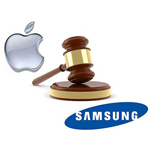
Apple Inc. lawsuit against Samsung Electronics Co., Ltd. was the first of a series of ongoing lawsuits regarding the design of their smartphones and tablet computers.
As of July 2012, both companies made more than half of smartphones sold worldwide as of July 2012. Apple began litigating against Samsung in patent infringement suits in 2011. Apple's multinational litigation over technology patents became known as part of the mobile device patent wars in the competition of a fierce global market for consumer mobile communications.
On April 15th, 2011, Apple sued Samsung, its component supplier, in a 38-page federal complaint in the United States District Court for the Northern District of California that several of Samsung's Android products, including the Nexus S, Epic 4G, Galaxy S 4G, and the Samsung Galaxy Tab, infringed on Apple’s intellectual property: its patents, trademarks, style and user interface. Apple's complaint included specific federal claims for patent infringement, trademark infringement, false designation of origin and unfair competition.
A week later, Samsung counter-sued Apple, filing federal complaints in courts in Seoul, Tokyo and Mannheim, Germany, alleging Apple infringed Samsung's patents for mobile-communications technologies. By summer, Samsung also filed suits against Apple in the U.K. High Court of Justice, in the United States District Court for the District of Delaware, and with the United States International Trade Commission (ITC), all in June 2011.
Since April, both companies had filed several lawsuits in several countries: Seoul and Tokyo courts, German courts, Paris and Milan courts, Dutch courts, Australian courts, U.K. courts and U.S. courts. In the U.S. courts, both companies accused one another of infringing several patents.
Apple brought three utility and four design patents to bear against Samsung. Patent number 7,469,381 is for the bounce back that occurs when a user scroll beyond the edge of a webpage or document in iOS. Patent number 7,844,915 is for single-finger scrolling and two-finger zooming, while number 7,864,163 claims tap-to-zoom technology. As for the design patents, D618,677 claims the iPhone's edge-to-edge glass, speaker slot and display border, while D593,087 claims its rounded corners and home button, and D604,305 claims the grid-style icon layout in iOS. The last design patent, D504,889 is for the iPad's edge-to-edge glass, rounded corners, and thin bezel.
Judge Lucy H. Koh ruled that Apple's claims of irreparable harm had little merit because although Apple established a likelihood of success at trial on the merits of its claim that Samsung infringed one of its tablet patents, Apple had not shown that it could overcome Samsung's challenges to the patent's validity.
In June 2012, Judge Koh granted Apple's motion for a preliminary injunction as to Samsung’s Galaxy Nexus, and thus enjoined Samsung from making, using, offering to sell, selling, or importing into the U.S. the Nexus and any other of its technology making use of the disputed patent. Simultaneously, Apple was ordered to post a $95.6 million dollar bond in the event that Samsung prevailed at trial. A U.S. jury trial was scheduled for July 30, 2012 and calendered by the court through September 7, 2012.
On August 24, 2012 the jury returned a verdict largely favorable to Apple. It found that Samsung had willfully infringed on Apple's design and utility patents and had also diluted Apple's trade dresses related to the iPhone. The jury awarded Apple a billion dollars ($1,049,393,540) in damages and Samsung zero damages in its counter suit.
Naturally, the both tech company giants differ in their viewpoints on this ruling, with Apple celebrating a decision that supports its originality and innovation. Both companies have released statements on the matter, with Apple sending a loud and clear message that "stealing isn't right." Samsung has its own viewpoint calling this "a loss for the American consumer" that will lead to fewer choices, less innovation and high prices.
The war between Apple and Samsung continued to the England and Wales High Court where Samsung is appealing the verdict.